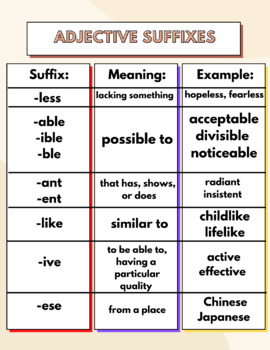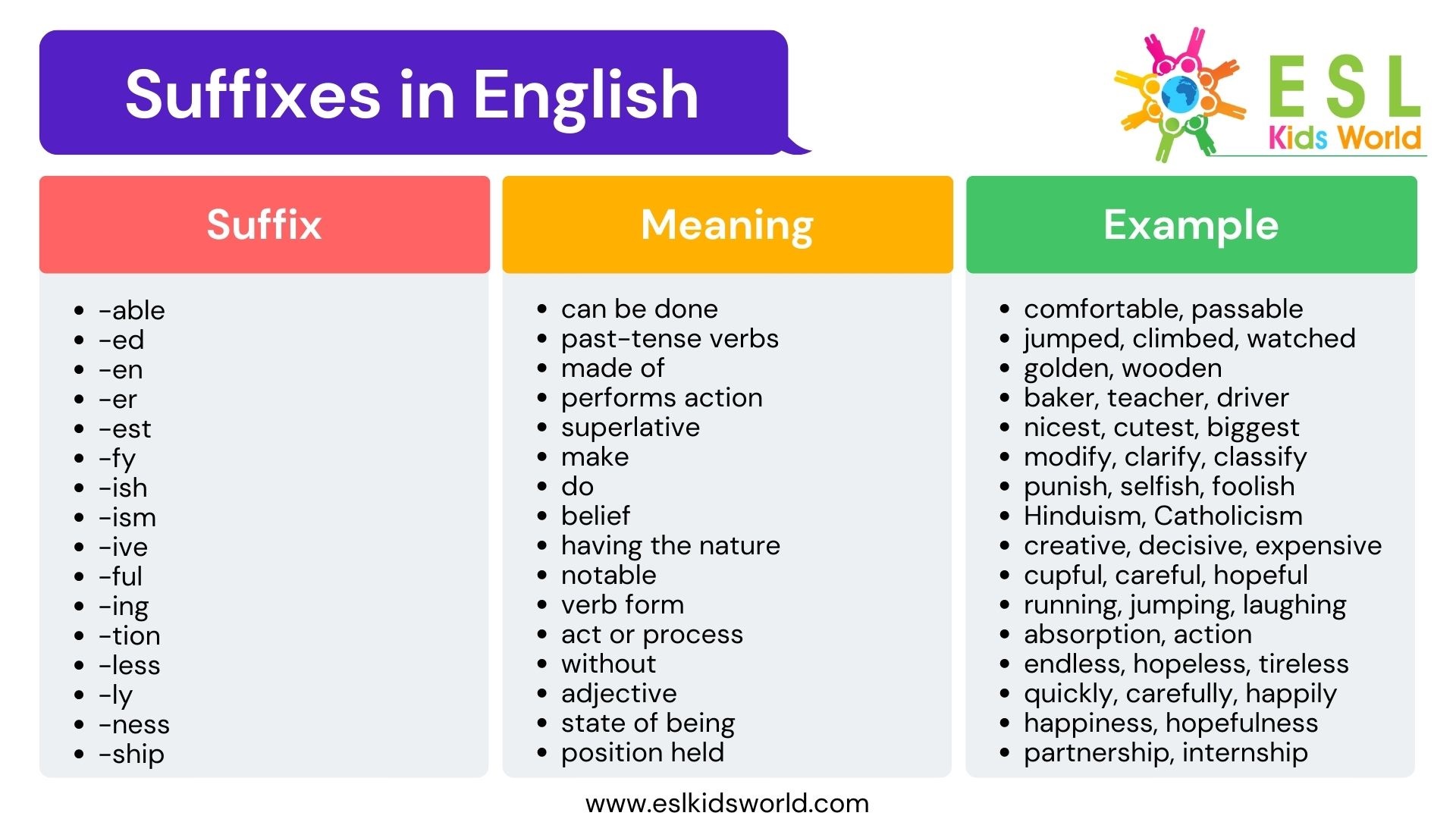English Adjective Suffixes List Definition And Examples 53 Off

Adjective Suffixes Useful List And Great Examples 7esl 53 Off Examples: beautiful, powerful, successful. ic: this suffix is used to form adjectives that pertain to or show a characteristic of a specific noun. examples: scientific, artistic, romantic. ive: this suffix generates adjectives that express the tendency or disposition of a certain action or behavior. List of suffixes for adjectives. suffixes are affixes that are added to the end of a base word to alter its meaning or grammatical function. in the context of adjectives, suffixes can change the way we perceive or describe something, such as indicating size, quality, or manner. let’s explore some common adjective suffixes along with their.

Adjective Suffixes Useful List And Great Examples 7esl Adjective suffixes spelling and explanation. n noun | v verb | adj adjective. example #1: n = cs a noun that ends in cs. example #2: v = pel a verb that ends in pel. example #3: politi cs => politic ian | n = cs s ian | 'politics' ends in cs, the s is dropped and replaced with the suffix ian. example #4: com pel => compul sion. English adjective suffixes list, definition and examples adjective suffixes a suffixe is a group of letters letters added to the end of the word to create a new word or change the grammatical function (part of the conversation) of the original word. when added to a noun, verb or adjective, the suffixes that form nouns (noun derivative suffixes) and the meanings they add to the word are as. A suffix is a letter or group of letters affixed to the end of a word to create a different word. some suffixes are single letters; for example, in the word floors, s is a suffix indicating that the noun, floor, is plural. others are multiple letters; for instance, in the word brightest, the suffix est makes the adjective, bright, superlative. An adjective suffix is added to verbs and nouns to create an adjective. common adjective suffixes include ious, ish, less, i’ve, etc. 3. give examples for the adjective suffix ‘ish’? an adjective is that which describes a noun. an adjective suffix is added to verbs and nouns to create an adjective. therefore, adjective suffixes change the.

English Adjective Suffixes List Definition And Examples 53 Off A suffix is a letter or group of letters affixed to the end of a word to create a different word. some suffixes are single letters; for example, in the word floors, s is a suffix indicating that the noun, floor, is plural. others are multiple letters; for instance, in the word brightest, the suffix est makes the adjective, bright, superlative. An adjective suffix is added to verbs and nouns to create an adjective. common adjective suffixes include ious, ish, less, i’ve, etc. 3. give examples for the adjective suffix ‘ish’? an adjective is that which describes a noun. an adjective suffix is added to verbs and nouns to create an adjective. therefore, adjective suffixes change the. Here’s a full list of adjective suffixes in english: able: able to be done or able to be used. al: related to a certain thing. ful: full of a certain quality. ic: pertaining to a certain thing. ive: having a certain quality. less: without a certain quality. ous: full of a certain quality. y: having the characteristics of something. Definition and examples. suffixes are letters added to the end of a base word to change its conjugation, word type, or other grammar properties like plurality. for example, take the noun strength: you can add the suffix –s to make it plural (strengths) or the suffix –en to change it into a verb (strengthen). you can then add the suffix.

Adjective Suffixes Useful List And Great Examples 7esl Here’s a full list of adjective suffixes in english: able: able to be done or able to be used. al: related to a certain thing. ful: full of a certain quality. ic: pertaining to a certain thing. ive: having a certain quality. less: without a certain quality. ous: full of a certain quality. y: having the characteristics of something. Definition and examples. suffixes are letters added to the end of a base word to change its conjugation, word type, or other grammar properties like plurality. for example, take the noun strength: you can add the suffix –s to make it plural (strengths) or the suffix –en to change it into a verb (strengthen). you can then add the suffix.

Comments are closed.